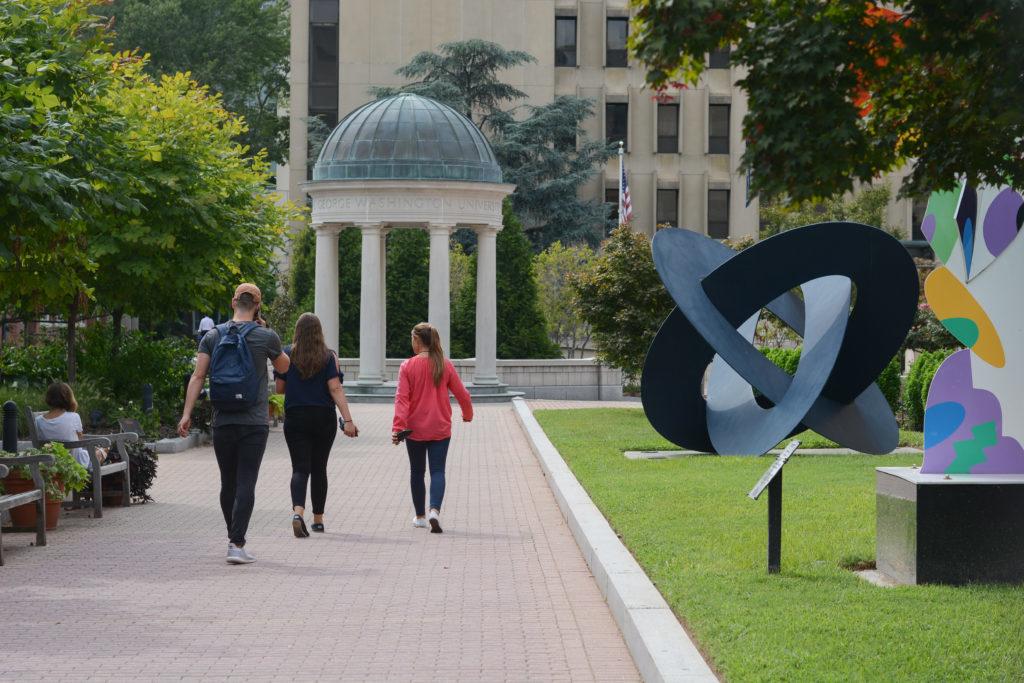Officials are entering the final phase of a more than two-year process to ensure the University meets national higher education standards.
Cheryl Beil and Paul Duff, co-chairs of the steering committee leading the accreditation effort, said committees have already examined the University’s performance across a range of topics and identified areas of strength – like international student support and career services – and weakness – including international diversity and retention rates. Officials said the process comes at an opportune time, giving GW a chance to assess its overall standing just as a new University president arrives on campus.
“The self-study helps the University plan for the future,” Duff said in an email. “Also, the timing of the self-study is helpful, as it will provide our new president with a snapshot of where the institution is at present.”
A draft of the review will be submitted to the Middle States Commission on Higher Education, GW’s accrediting body, this fall after soliciting feedback from the University community. The entire process is expected to be completed by next spring, when a visiting team will come to campus to complete their own evaluation. The final reaccreditation decision will be made in June 2018.
Accreditation is a voluntary peer-review process that occurs every ten years and regulates educational institutions, requiring disclosures about admission requirements, cost and anticipated post-graduation salaries, according to the Middle States’ website.
In 2016, officials selected Beil, the associate provost for academic planning and assessment, and Duff, a professor of religion, to head the committee overseeing the process. The steering committee consists of eight working groups that each examine specific topics like budget planning, research and student experience.
Those groups all drafted individual self-study evaluations last academic year and turned in final reports to Duff and Beil. Duff said that a Middle States Commission visiting team will meet with University President Thomas LeBlanc – who assessed GW a decade ago as part of a previous visiting accreditation team – and other officials this fall prior to drafting their final report.
“This peer review process is a great opportunity to be self-reflective on who we are as we aspire to be a comprehensive research institution and enables us to self-identify what we can do to ensure a unique and rigorous educational experience for our students,” Maltzman said in an email.
Beil said the University has met all seven standards set by the commission, but that it has identified a lack of diversity in the nationalities of its international students and lagging six-year graduation rates as areas for improvement.
Both have been topics of University-wide focus in recent years as officials have sought to increase international enrollment and raise six-year graduation rates, which have historically failed to keep pace with most of GW’s peer institutions.
The committee’s subgroups found significant improvement in how individual schools assess student learning, as well as University-wide support for international students and increased staff in the Center for Career Services, which has grown over the past three years, propelled by large donations.
Sherry Davis Molock, an associate professor of psychology and member of the group focused on the University’s mission and goals, said cross-disciplinary learning was a major area of interest for faculty on her committee.
“One of the big pushes not just at GW but at all universities is to really push for students to develop good critical thinking skills,” Molock said.
She said the accreditation process is important to hold universities accountable for goals they have set or statements they have made, like increasing diversity among students, staff and curricula.
“We want to prepare the next generation of people to live in a world that’s much more diverse, so what are we doing to make sure that happens, and that is the beauty of having these accreditation processes,” Molock said.
Carol Sigelman, the chair of the psychology department and member of the group examining planning, resources and institutional improvement, said the self-studies are important to ensure the University is keeping up with constantly evolving national standards.
She said in the last reaccreditation of the University in 2007, the commission sought improvement in how faculty gauge student learning and understanding of the course material. The commission wanted to see a more systematic approach to document student progress with course evaluations.
The self-study found that their efforts have been successful thus far, Sigelman said.
“This is a process that helps the University make sure that it is complying with the basic standards and keeping up with changes in those standards too, because those standards do change,” Sigelman, who participated in two previous accreditation efforts, said. “You have to be on top of it.”





